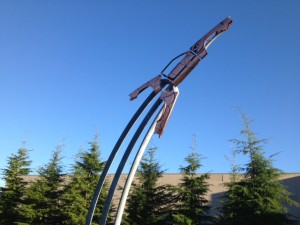As a brief aside from our LFS project, today we are posting about a very important event that has taken place here in Vancouver, BC.
On September 18th, 2013, all classes at the University of British Columbia were suspended in support of British Columbia Reconciliation Week, an awareness week held by the Truth and Reconciliation Commission of Canada (TRC). The most important part of the week was the British Columbia National Event, which took place in Vancouver at the Pacific National Exhibition grounds from September 18th to 21st. UBC’s unusual act of suspending classes was taken in order to ensure that everyone on campus had the opportunity to attend the event. Furthermore, we, as residents of British Columbia, can reflect on the truth behind what really occurred in Indian Residential Schools.
What is the event about?
British Columbia Reconciliation Week and the British Columbia National Event are being held to inform Canadians about the lasting effects that the Indian Residential School System–which operated in Canada from 1875 to 1996–has had on the countless individuals who were affected by it, in order to facilitate healing and reconciliation for them, and foster understanding in our culture as a whole. Specifically, children were taken away from their Aboriginal families and were forced into schools where they were abused into forgetting their cultural identity and traditions. The former Indian Residential School students who were affected include First Nations, Inuit, and Metis. It has also had lasting effects on their communities, the Church, and the Government.
Our Experience and Opinions on the Matter
As a group, we are glad that the issue is being addressed publicly, and we feel that UBC’s decision to suspend classes demonstrates the University’s commitment to promoting positive social change. As students of UBC, we feel proud to be a part of the campus community and, through our own actions and the actions of the University, a part of the change we want to see. Sadly, Aboriginal history is unknown to many, including many Canadian residents. As TRC becomes more widespread, we hope more individuals will be aware of the cruelty and injustice several Aboriginal Canadians had to face.
We hope that events such as this one can help to improve social relations between Aboriginal and non-Aboriginal Canadians. By participating as a school, we are recognizing and acknowledging its importance.
You can click here to find out more about the event:
- This is the TRC’s website: http://www.trc.ca/
- This is UBC’s website: http://irsi.aboriginal.ubc.ca/
This week’s Itinerary
The CBEL project proposal deadline is fast approaching and we are still unclear as to what our research question(s) should be. We are having our second official group meeting this upcoming Thursday. We will be critically analyzing the Gage Snack Vending Model and coming up with ideas on ways to replace unhealthy snacks with healthier ones. Since we do not have class this Wednesday, our group has decided to use the extra time to come up with ideas for our CBEL project proposal, which will be shared during our first meeting.
More to come from our group this upcoming week: specifically, we will be discussing our meeting with Victoria and Liska, our community partner and project manager, respectively. We will also be posting our research question onto our blog shortly.
Hope you are enjoying the beautiful fall weather,
Group 26


